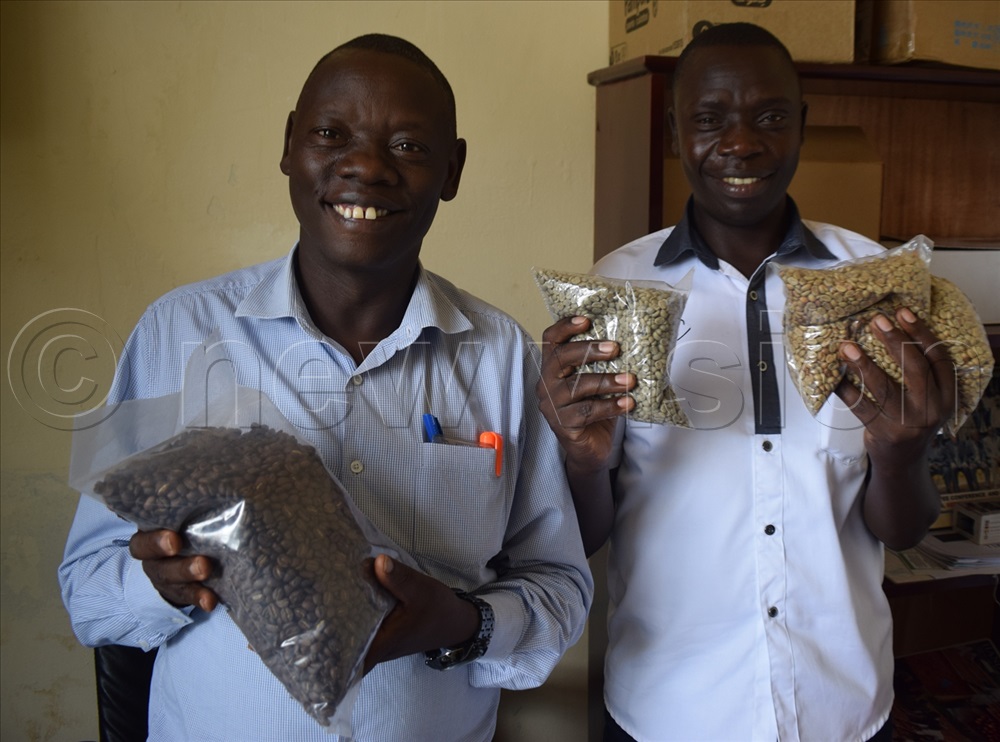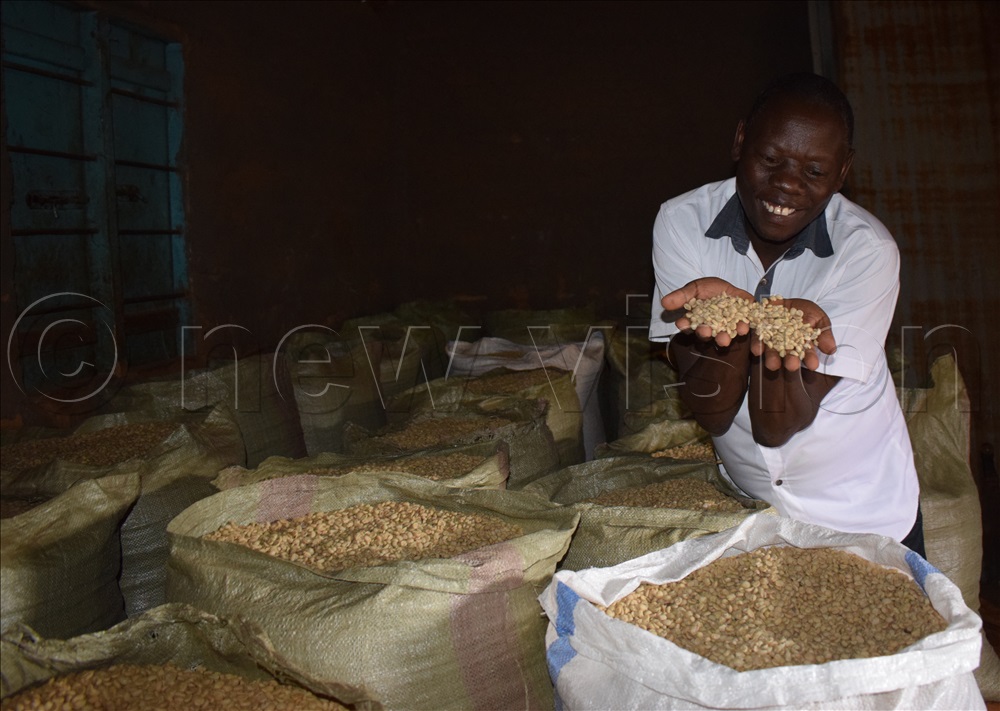For the eighth year running, Vision Group, together with the Embassy of the Netherlands, KLM Airlines, dfcu Bank and Koudjis Animal Nutrition, is running the Best Farmers’ competition.
The 2023 competition runs from March to November, with the awards in December. Every week, Vision Group platforms will publish profiles of the farmers. Winners will walk away with sh150m and a fully paid-for trip to the Netherlands.
By Moses Nampala
For ages, processed foods and beverages from Africa have not made it beyond airports and seaport terminals, without authorities faulting them for failing to meet safety standards.
However, Martin Nangoli, an Arabica coffee farmer and exporter in Bulambuli district, has broken this boundary.
For five years now, Nangoli exports ‘farm-to-cup’ quality arabica coffee from the Elgon region, eastern Uganda.
“While it’s true that markets overseas have accepted my finished products, mainly because of the distinct natural flavour and taste of my beverage (arabica coffee); to meet international standards has largely taken investing in high-tech machinery,” Nangoli, also the director of the Kikobero Arabica Coffee brand, says.
The 50-year-old boasts of working with 420 individual farmers in the mountainous countryside, Masila sub-county in Bulambuli district to deliver the product.
The 420 individual smallholder farmers are trained and certified in organic crop husbandry. They are also periodically subjected to evaluation by the Uganda Coffee Development Authority (UCDA).

“To survive in the trade, one ought to strategically position themselves, which explains why I opted for growing organic arabica coffee,” Nangoli notes.
Organic Arabica coffee farming
Nangoli’s coffee exports have been rising, which gives encouragement to other Arabica coffee farmers in the Elgon sub-region to benefit from the growing market.
“The 420 farmers that have embraced organic Arabica coffee cannot meet the export demand, which explains why we are imploring others to embrace organic/ specialty farming.”
Nangoli acquired the export license for processed Arabica coffee in 2018 under the Kigobero Arabica Coffee brand.

“My last consignment of the beverage for export, last season (2022) had a gross weight of 1,200kg, compared to my maiden consignment in 2018, which was 350kg,” Nangoli says.
Taking a decision to concentrate on organic arabica coffee in 2008, arose from the preferences of his clients in the UK, Germany, Singapore, Ireland, Scotland, and lately Czechoslovakia. He packages his product in quantities of 250 grammes.
“Each pack is sold at $6 (sh21,600), of which I earn sh10,000.”
Nangoli adds that his clientele caters to the processing and freight charges. To ensure he delivers a quality product, Nangoli works with officials of the Uganda Coffee Development Authority.
The body’s primary functions include promoting coffee production and helping key players in the coffee industry to embrace value-addition chains required on the beverage.
“UCDA referred me to the Makerere University Agricultural Research Institute (MUARIK), one of the entities in a joint venture with UCDA,” he says.
“MUARIK not only hosts a pool of eminent discipline (coffee) experts in value addition chain but it also has a fully-fledged wing with high tech value-addition chain machinery infrastructure — the only one in the country capable of offering services that are accepted internationally.”
Green Arabica coffee beans
To be born in the green arabica coffee growing belt of the Elgon sub-region means that Nangoli is no stranger to the cash crop.
“Over the years, I’ve accumulated both good traditional ideas and modern practices, while continuing to seek more knowledge to improve the quality and quantity of my crop,” he says.
Today Nangoli boasts of 3,500 Arabica coffee trees he has grown on separate pieces of land he bought around his village.
A conservative evaluation of his patched coffee yield, a season is about 17,500 kg. The export of processed coffee is his second venture.
He started with the export of green Arabica coffee beans in 2011, after obtaining a license to do so. His last green Arabica coffee beans export consignment was 7,200kg, almost six-fold more than his maiden export consignment in 2011, which weighed 1,400kg.
“Last season (2022), each kilo of the beans fetched $9,” he says.
Achievements
Nangoli doesn’t regret committing his life to coffee.
“From a residential home in a prime area of Mbale city, two private schools that I have constructed and innumerable other properties I have acquired, are all dividends acquired over the years from my coffee enterprise.
Profile
Born 50 years ago to Samuel and Inide Nangoli of Gabugobo village, Masila sub-county, in Bulambuli district, Nangoli is the eldest of seven children.
Coming from a family gnawed by poverty, his age mates and many others in his home village consider Nangoli a fighter who began his life from scratch. Coming from a modest home, he started doing odd jobs in his youth to earn a living.
“I used to pick coffee for wealthy families at a fee,” he says.
But, honesty was to become his biggest asset later in his youthful age, as traders would entrust him with money to buy them coffee from farmers. He would save whatever he earned.
“I would buy fresh coffee from the farmers, process and sell it to big dealers at a profit”
Around the same time, Oasis Trust, an international organisation based in the United Kingdom sought an enlightened, selfless, hard-working field person to co-ordinate its activities in Elgon sub-region.”
His primary role upon recruitment would be to make internal travel and booking accommodation for overseas teams that included students and professionals visiting Uganda.
As he interacted with the visitors, he told them he was engaged in the Arabica coffee trade and a one Matt Mellor, an anthropologist, linked him to Sunnyhill Church Ltd in the UK where he soon started exporting the crop.
Post-harvest handling
Arabica coffee is processed using either the natural process or the wet method. With wet process, the ripe cherries are fed into a pulping machine, which is either manually operated or motorised.
Pulping is aimed at extracting the beans from the outer red coat. The next step is to wash the beans in clean water and then spread on a slab or a tarpaulin to dry under open sunshine.
With the natural process, the ripe cherries are spread out in a greenhouse or racks. A greenhouse is an arch-shaped structure covered by a translucent, roofing material.
The natural process in the Elgon sub-region is not common as it calls for heavy investment in the construction of greenhouses. Moses Gidudu, Nangoli’s greenhouse manager, says it takes 27-32 days for the arabica coffee cherries in the greenhouse to dry before they can be milled.
Challenge
Like any person involved in an economic activity, Nangoli is not immune to challenges but he prefers to stick to a peculiar one.
His lowest moment was a year ago when foreign nationals hatched a plan to shut down his business but were unsuccessful.
“I stumbled on them during my coffee trade errands overseas. They feigned friendship and soon became my frequent guests. Our relationship was purely fraternal and not in any way linked to my coffee business,” he notes.
Soon they would pester me to take them to my home village and I obliged.
“However, it turned out that my guests were convincing my clients to stop selling their coffee to me and instead sell it to them, promising a higher price, a move the farmers rejected,” he says.
“I’ve since weathered the storm as my clients are making fresh orders after learning about their botched plan.”
Others say…
James Simpson, coffee roaster, Scotland
When I scrutinized the finished Kigobero coffee brand obtained from the natural process, it tasted like a stewed apple, with a hint of cinnamon, clove, dandelion and burdock. Very, unique. I have never tried coffee like it.
Fergie Brown, coffee roaster, Ireland
Apart from the beverage being single-sourced, it is incomparable in taste that it leaves one yearning for more.
Philister Netalisile, farmer
I learnt about organic farming from Nangoli and ever since, my earnings have increased five-fold.
Philip Edmond, coffee roaster, UK
I have had time to thoroughly scrutinize washed green Arabica coffee beans of the Kigobero brand over the years and I’m proud to confess that it’s among the top.





